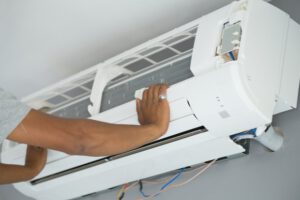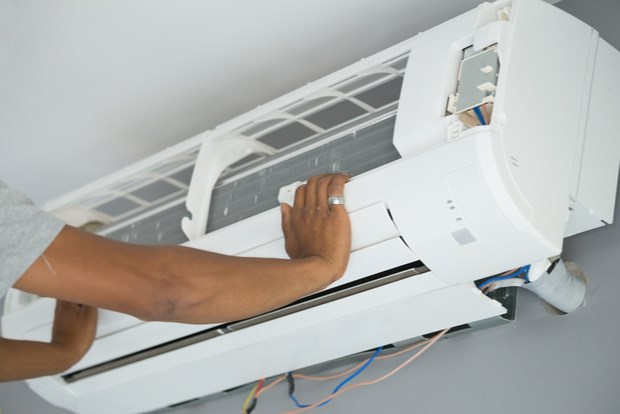Your AC system contains a complex system of parts, including evaporator coils and the compressor. They can get clogged with dirt, which causes the system to work harder.
Diminished airflow is a clear sign of a malfunction. It could be caused by a clogged filter, frozen evaporator coils, or a problem with your ductwork. For professional help, contact Heating And Cooling Van Nuys now!
Thermostats are the gateway to your entire air conditioning system, so if they aren’t working correctly, the whole house may suffer. There are many reasons why your thermostat might not be operating properly, but a few simple solutions can help you get it up and running again.
The first thing to try is to change the batteries. If you click on any button and the screen goes dark, there’s no power to the thermostat, and it cannot send a signal to your AC unit to turn on. This is a simple fix that can solve most problems immediately.
If the thermostat’s screen is dark, you should also check the breaker and fuse in your home’s electrical panel. Sometimes, these items can be tripped or blown, preventing the thermostat from receiving power. If this is the case, you can reset the breaker or replace the fuse. If you do this, but the thermostat still doesn’t work, there could be a mechanical or calibration problem with an internal part.
Sometimes dust, dirt, and lint can make their way inside the thermostat’s sensors, and this can cause them to read a different temperature than the actual room. This can lead to the system running constantly, or it may struggle to keep up with cooling demands. You can remove the cover and clean the sensor with canned air or a soft brush to clear out any debris that has built up.
A common problem is that the thermostat is installed crooked, and this can affect its ability to sense room temperature correctly. You can test this by putting an ordinary household thermometer in the same room as your thermostat. If the readings are significantly different, you have a calibration issue that requires professional assistance. A licensed specialist can quickly figure out what is wrong and get your thermostat working properly again. They have the tools, skills, and knowledge to do this safely and quickly. They can even help you decide if the issue is with your thermostat or with another component of your AC system.
Burning Smells
There are many things that can cause a burning smell from your AC, from a simple dust buildup to an electrical problem. If the burning odor is accompanied by other issues, such as a tripping circuit or a decrease in cooling efficiency, then it’s time to call an HVAC professional to perform an inspection and make repairs.
One of the most common reasons for a burning smell from an AC unit is that it’s overheating. This can occur when the fan motor is overworking or if there’s a fault in the capacitor that helps it run.
The first thing you should do if you notice a burning smell from your air conditioner is to turn it off and wait for the odor to dissipate. If the smell doesn’t go away after several minutes, it’s a sign that something serious is wrong with your AC system, and you should call an HVAC company right away.
A clogged filter can block airflow to key parts of your system, such as the blower motor. This will cause the motor to work harder to cool your home, and over time, this can lead to a burning smell from your AC. To prevent this, change your air filters at least every three months, or once a month during periods of heavy use.
Another reason your air conditioner might be burning is that the bearings on the fan motor are starting to wear out. This can also result in a burning smell, but this is an easy fix that a service tech can handle for you by turning off your system and cleaning and lubricating the fan motor bearings. If this doesn’t solve the issue, then you may need to replace the motor itself.
The final reason your AC may be burning is that there are open chemical containers stored near the system. If these aren’t properly sealed, they can leak chemicals into the system and be forced through the ductwork and into your home. These chemicals can be very dangerous, especially if inhaled, and are best addressed by a professional right away.
Leaking Water
As the evaporator coils in your AC unit cool the air, they produce condensation. This normally collects in a drain pan and then flows into a drainage system that funnels it outside. However, if something goes wrong with this process, you might have a leaking AC. Thankfully, most AC leaks are fairly simple to resolve without causing any significant damage.
Leaking water from the AC is often caused by a blocked or clogged condensate line. Over time, dirt and dust can build up inside the line. Mineral deposits and algae can also block the flow of water. If the drain line becomes completely clogged, it may flood the pan and then leak throughout your home.
The drain line may also become disconnected from the drain pan. This can happen during installation, after a repair, or simply due to age. If you have a disconnected drain line, call an HVAC technician as soon as possible to prevent damage from occurring.
Another common reason for a leaking AC is that the drain pan is rusted or cracked. Ideally, the drain pan should be constructed of galvanized steel to resist corrosion and rust. If the pan is corroded, it can no longer trap the condensation and funnel it into the drain line.
If you suspect this is the case, replace the pan as soon as possible. You can do this yourself if the pan is relatively low to the ground, but it might be easier for an HVAC professional to do so.
The evaporator coils in your AC can freeze if the air conditioner is running when outdoor temperatures are below 60 degrees Fahrenheit. This happens because the evaporator coils aren’t cold enough to evaporate the condensation. The resulting ice on the coils will eventually melt and drip. Leaving the coils to thaw on their own is likely to lead to a lot of mess and possibly mold.
To prevent this from happening, keep the AC turned off when it’s cold outside and check the evaporator coils frequently to ensure they are clean. If they are dirty, wash them with warm water and a mild detergent.
not cooling enough
If you find that your air conditioner is not cooling at all or doesn’t cool as much as you think it should, this could be a sign of a refrigerant leak. A professional should diagnose this issue and repair it as soon as possible. If you attempt to fix a refrigerant leak yourself, it can damage your unit and possibly make the problem worse.
Another reason why your AC may not be working properly is because it has a dirty air filter. Air filters should be cleaned or replaced regularly, as instructed by the manufacturer of your unit. An air filter that is too dirty can cause your system to work harder, which leads to reduced efficiency.
A faulty thermostat can also prevent your AC from working properly. If it doesn’t match the temperature reading on your thermometer, it can cause inaccurate measurements and result in your AC system having to work harder than necessary. This can lead to higher energy bills, so it’s important to have your thermostat calibrated by a professional to ensure accuracy.
Lastly, your AC might be running but not cooling because it has a dirty evaporator coil or a clogged condenser coil. These coils are responsible for absorbing and releasing heat from your house, so they need to be clean in order for your system to function properly. This is a task that should be left to the pros, as attempting to clean or replace these coils yourself can void your warranty.
If your air conditioner isn’t cooling enough or is producing foul odors, it’s time to call for AC repair. We’ll help get to the bottom of what’s causing your AC to malfunction, so you can rest easy knowing it will be fixed as quickly and efficiently as possible. Using our extensive experience with both legacy and newer units, we can troubleshoot your problems quickly and find the right solution. Contact us today to get started!
